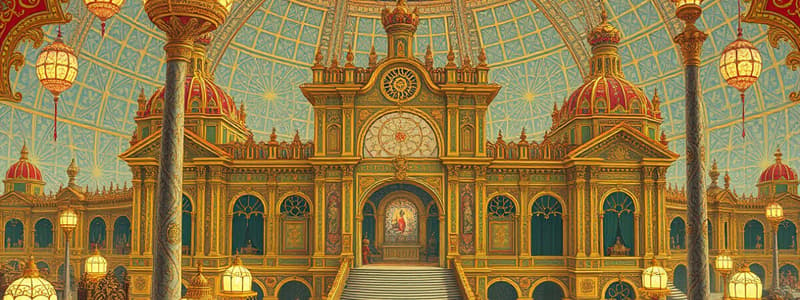Podcast
Questions and Answers
What is a key characteristic of a civilization?
What is a key characteristic of a civilization?
- Nomadic lifestyle
- Simple social structures
- Cultural and technological development (correct)
- Absence of trade centers
What role did rulers often play in early civilizations?
What role did rulers often play in early civilizations?
- They focused solely on trade relations.
- They were primarily military leaders.
- They served as chief priests and religious leaders. (correct)
- They were seen as ordinary citizens.
How did writing contribute to the development of civilizations?
How did writing contribute to the development of civilizations?
- It limited the ability to trade.
- It replaced the need for oral traditions.
- It allowed for historical record-keeping. (correct)
- It was used only for artistic expression.
What common function did cities serve in early civilizations?
What common function did cities serve in early civilizations?
What was a significant factor that set civilizations apart?
What was a significant factor that set civilizations apart?
In what way did religion influence governance in early civilizations?
In what way did religion influence governance in early civilizations?
What social structure was often evident in complex societies?
What social structure was often evident in complex societies?
Which of the following best describes the relationship between government and religion in early civilizations?
Which of the following best describes the relationship between government and religion in early civilizations?
Flashcards are hidden until you start studying
Study Notes
Understanding Civilizations
- Complex societies emerge from human efforts to establish order and organization.
- Distinct economic, political, and social patterns characterize each civilization.
- Understanding social complexity involves exploring the origins and uniqueness of civilizations.
Definition of Civilization
- A civilization is a complex human society typically comprising multiple cities.
- Key characteristics include cultural and technological advancements.
- The definition of civilization remains debated among anthropologists.
Structure of Civilizations
- Civilizations consist of large groups of people residing in specific geographic areas.
- Cities act as trade centers, where goods and services are produced and exchanged.
Government and Religion
- Governments in ancient civilizations were often intertwined with religious beliefs.
- Rulers were perceived as either deities or divine representatives, acting as chief priests.
- Laws reflected divine commands, with priests playing significant roles in governance.
Societal Roles and Classes
- Societies featured specific job roles with distinct requirements and specialties.
- Social stratification occurred, encompassing groups differentiated by wealth, property, and rights.
Record-Keeping and Writing
- Civilizations developed writing systems for documenting history, culture, and trade.
- The advent of written history coincides with the rise of complex societies.
- Material evidence from ancient civilizations provides insights into culture, history, and daily life.
Infrastructure and Public Works
- Civilizations constructed infrastructure like roads, dams, and public buildings.
- These public works were financed by government funds to support the society's needs.
Studying That Suits You
Use AI to generate personalized quizzes and flashcards to suit your learning preferences.




